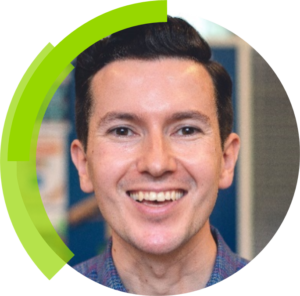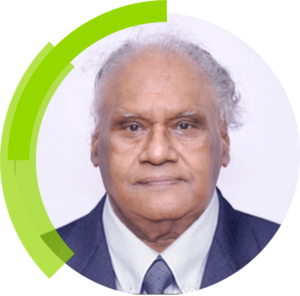Introducing the Materials Horizons Advisory board!
This year we are pleased to celebrate the tenth anniversary of Materials Horizons. We are so grateful to our fantastic community of authors, reviewers, Board members and readers and wanted to showcase just some of them in a series of ‘Community Spotlight’ blog articles.
In our first ‘Community Spotlight’, we feature some of the Advisory Board members who have supported Materials Horizons over the years. We have asked them what they like most about being on the journal’s Advisory Boards, about their recent publications and about their own insights into the future of materials chemistry. Check out their interview responses and related articles below.
| Aron Walsh, Advisory Board member.
Imperial Collage London, UK. |
Aron Walsh is a Full Professor and Fellow of the Royal Society of Chemistry (RSC) in the Department of Materials. He leads the Materials Design Group at the Thomas Young Centre in London and holds a Distinguished Visiting Professorship at Ewha Womans University in Seoul.
Aron was awarded his PhD in Chemistry from Trinity College Dublin. He then worked for the US Department of Energy at the National Renewable Energy Laboratory, followed by a Marie Curie Fellowship hosted by University College London, and a Royal Society University Research Fellowship held at the University of Bath.
His research involves cutting-edge materials theory and simulation applied to problems across solid-state chemistry and physics, including materials for solar cells and fuels, batteries, thermoelectrics, and solid-state lighting. He has expertise in the theory of semiconductors and dielectrics, and is developing innovative solutions for materials data, informatics and design.
| Where do you see the materials chemistry field in the next 10 years?
“In the next 10 years, materials chemistry will be influenced by the increasing significance of data. Data will play a dual role, enhancing research reproducibility and expediting scientific breakthroughs. By adopting data-driven techniques, researchers can leverage large structure-property datasets and advanced analytics to gain deeper insights, optimise materials, and accelerate the pace of discovery. We will need to foster community consensus in terms of formats, repositories, and ontologies, but in the end, this will yield substantial long-term benefits.” Could you provide a summary of your most recent Materials Horizons publication? “I am captivated by the influence of temperature on the structures and properties of solids. While traditional approaches excel in modelling the behaviour of dense inorganic crystals, they struggle to scale up for the new generation of flexible metal-organic or covalent-organic frameworks. Here, Ju Huang showcased the effectiveness of machine learning in addressing this challenge. Her study revealed how the local structure of layered frameworks dynamically distorts over time, leading to the emergence of average features observed in experimental probes. The development of machine-learned forcefields to describe crystal dynamics is helping to bridge the length and timescale gaps between modelling and measurements in materials chemistry.”
You can find this article by Ju Huang, Aron Walsh et al. here: ‘Room-temperature stacking disorder in layered covalent-organic frameworks from machine-learning force fields’ Ju Huang, Seung-Jae Shin, Kasper Tolborg, Alex M. Ganose, Gabriel Krenzer and Aron Walsh. https://pubs.rsc.org/en/content/articlelanding/2023/MH/D3MH00314K
|
| Mengye Wang, Advisory Board member.
Sun Yat-Sen University, China |
Dr Mengye Wang obtained her PhD from the Department of Chemistry, Xiamen University, Fujian, China, (2010 – 2015) one year and a half of which was spent as a visiting PhD student at Georgia Institute of Technology, Atlanta. She completed her post-doctoral fellowship in Applied Physics at The Hong Kong Polytechnic University (2018) and was shortly appointed her current role as Associate Professor at the School of Materials, Sun Yat-sen University. Dr Wang’s interests lie within the field of photocatalytic, electrocatalytic and piezocatalytic H2 evolution, CO2 reduction, N2 fixation and H2O2 generation. From 2015 Dr Wang has been an active community board member for Materials Horizons and later in 2019 accepted an advisory board role for Materials Advances and Journal of Materials Chemistry A.
| What do you like most about being on the Advisory Board for Materials Horizons?
“Having more opportunity to reach out to outstanding scholars.”
In your opinion, how could the journal engage more with members of the community? “It would be great if the journal could hold offline meetings to give board members the opportunity to get to know each other more. “
You can read Mengye Wang’s latest article in Journal of Materials Chemistry A here: ‘Highly selective semiconductor photocatalysis for CO2 reduction.’ Shan Yao, Jiaqing He, Feng Gao, Haowei Wang, Jiahui Lin, Yang Bai, Jingyun Fang, Feng Zhu, Feng Huang and Mengye Wang. https://pubs.rsc.org/en/content/articlelanding/2023/ta/d2ta09234d
|
| Jurriaan Huskens, Advisory Board member.
University of Twente, Netherlands. |
Jurriaan Huskens (1968) obtained his PhD (1994) at the Delft University of Technology with Herman van Bekkum. After postdoctoral stays with Dean Sherry and Manfred Reetz, he became an assistant professor with David Reinhoudt at the University of Twente in 1998, and a full professor of the Molecular Nanofabrication group in 2005. He received the Unilever Research Award (1990), a Marie Curie fellowship (1997), the Gold Medal 2007 of the Royal Netherlands Chemical Society, and a fellowship from the Institute of Advanced Study, Durham University, UK (2019). He is a (co)author of about 400 refereed research papers, five patents, and a book on Multivalency.
Jurriaan’s present research interests include supramolecular chemistry at interfaces, supramolecular materials, multivalency, nanofabrication, and green chemistry.
| Where do you see the materials chemistry field in the next 10 years?
“In the next 10 years we will see a further integration of materials chemistry with biology. This integration deals with the design and implementation of materials in biological environments as well as the merging of biological concepts and components in the assembly of new materials.” Could you provide a summary of your most recent Materials Horizons publication? “Vesicles provide an immense source of inspiration. They use lipids, the natural components of cell membranes, to form a shell that provides compartmentalization, a contact point for interactions with the outside world and a barrier to control the transfer of signals and molecules. Vesicles can be used to build artificial cells (Y. Lu, G. Allegri, J Huskens; 2022). These artificial cells can span the whole range from fully de novo designed materials to systems that are hosting complex biological machineries. For me personally, the molecular properties of cell membranes, such as dedicated chemical functionalization and control over properties of binding and mobility, remain fascinating and provide fantastic opportunities for future work.”
You can find this article by Lu, Allegri and Huskens below: ‘Vesicle-based artificial cells: materials, construction methods and application.’ Yao Lu, Giulia Allegri and Jurriaan Huskens https://pubs.rsc.org/en/content/articlelanding/2022/mh/d1mh01431e |
| C.N.R Rao, Advisory Board member.
Jawaharlal Nehru Centre for Advanced Scientific Research, India. |
C.N.R. Rao has been working in the area of chemistry of materials for more than 65 years. He is the author of over 1790 research papers in this area and has authored and edited 56 books. He started working on the chemistry of nanomaterials well before nanoscience became a popular area of investigation. In the late 1980’s and early 1990’s, he started investigating the electronic structures of small metal nanocrystals. During that period, he carried out studies of fullerenes as well. Since then, he has carried out investigations of a variety of nanomaterials including nanocrystals, nanowires, and nanotubes and nanofilms. His contributions relate to new synthetic methods, new materials, properties, and phenomena. Thus, he has not only discovered new methods of synthesizing and purifying carbon nanotubes, but also a simple way to separate metallic and semiconducting carbon nanotubes. His contributions to the synthesis and properties of graphene are noteworthy, the work on inorganic nanotubes and graphene analogues of inorganic layered materials being especially significant. Very recently, he has successfully carried out artificial photosynthesis and hydrogen generation using nanoparticles and nanosheets as catalysts.
Some industries/start-ups have made use of C.N.R. Rao’s work. (e.g., nanotube synthesis and purification, supercapacitor technology and metal-semiconductor CNT separation).
| What do you think of Materials Horizons as a place to publish impactful materials chemistry research?
“Materials Horizon summarizes the very best in materials science.”
Where do you see the materials chemistry field in the next 10 years? “I see a focus in the development of 3D Energy and Climate.”
You can read C.N.R Rao’s latest insightful perspective article on water splitting here: ‘Chemically functionalized phosphorenes and their use in the water splitting reaction.’ Pratap Vishnoi, Aditi Saraswat and C. N. R. Rao. J. Mater. Chem. A, 2022,10, 19534-19551. DOI: 10.1039/D2TA01932A https://pubs.rsc.org/en/content/articlelanding/2022/ta/d2ta01932a |
| Ye Zhou, Advisory Board member.
Shenzhen University, China |
Prof. Ye Zhou is a group leader in the Institute for Advanced Study, Shenzhen University, China. He was elected as Fellow of the Royal Society of Chemistry (FRSC) in 2021, Fellow of the Institute of Physics (FInstP) in 2022, and Fellow of the Institution of Engineering and Technology (FIET) in 2022. He received his B.S. from Nanjing University (2008), M.S. from Hong Kong University of Science and Technology (2009) and Ph.D. from City University of Hong Kong (2013). He worked as postdoctoral fellow and senior research fellow in City University of Hong Kong (2013-2015) and joined Shenzhen University in 2015. His research interests include nanostructured materials and nano-scale devices for technological applications, such as neuromorphic electronics, logic circuits, memory, photonics, and sensors.
| What do you like most about being on the Advisory Board for Materials Horizons?
“I can study from other members and share my knowledge and insights as an advisory board member. It offers me an excellent opportunity for networking and establishing valuable professional connections in materials research society.”
What do you think of Materials Horizons as a place to publish impactful materials chemistry research? “In my opinion, Materials Horizons is a prestigious and leading journal in materials chemistry research. There is a great editorial team to help the authors and papers published in Materials Horizons can receive widespread attention.”
You can read some of Ye Zhou’s most recent research, in the Journal of Materials Chemistry C, here: ‘Enhancing the stability of the polymeric Lewis-base-assisted dual-phase 3D CsPbBr3–Cs4PbBr6 perovskite by molecular engineering and self-passivation.’ Fang-Cheng Liang, Zhen-Li Yan, Dhana Lakshmi Busipalli, Jean-Sebastien Benas, Zhi-Xuan Zhang, Su-Ting Han, Ye Zhou, Jyh-Chiang Jiang and Chi-Ching Kuo. J. Mater. Chem. C, 2023,11, 307-320. DOI: 10.1039/D2TC03690H https://pubs.rsc.org/en/content/articlelanding/2023/tc/d2tc03690h |
We sincerely hope you enjoy reading about some of our superb Advisory board members and their latest research.
Keep an eye out for our second edition of the Advisory board Community spotlight!
Or to read more of our community spotlight blog, return to the home page here















